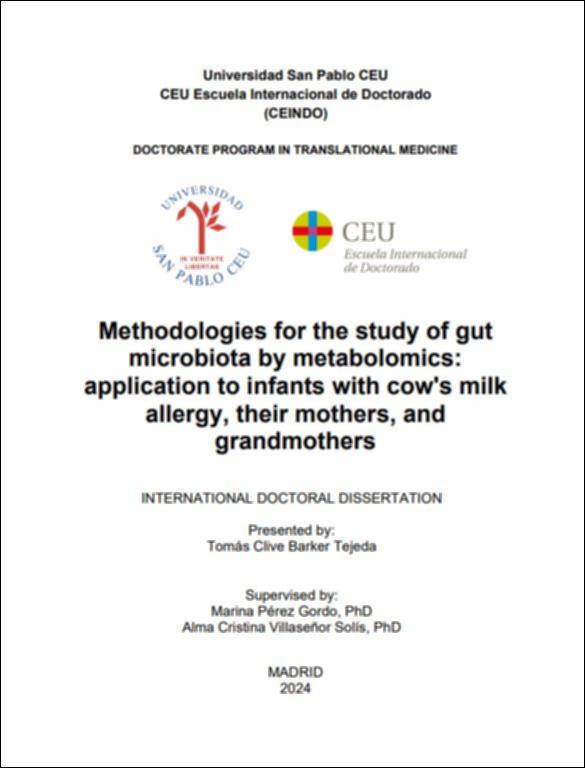Please use this identifier to cite or link to this item:
http://hdl.handle.net/10637/16114Methodologies for the study of gut microbiota by metabolomics: application to infants with cow's milk allergy, their mothers, and grandmothers

See/Open:
Methodologies_Barker_USPCEU_Tesis_2024.JPG
51,15 kB
JPEG
See/Open:
Methodologies_Barker_USPCEU_Tesis_2024.pdf
Until 2027-07-08
18,4 MB
Adobe PDF
Request a copy
| Title: | Methodologies for the study of gut microbiota by metabolomics: application to infants with cow's milk allergy, their mothers, and grandmothers |
| Authors : | Barker Tejeda, Tomás Clive |
| Keywords: | Alergia; Proteínas de leche de vaca; Microbiota intestinal; Metabolómica; Metagenómica; Allergy; Gut microbiota; Metabolomics; Metagenomics |
| Citation: | Barker Tejeda, Tomás Clive (2024). Methodologies for the study of gut microbiota by metabolomics: application to infants with cow's milk allergy, their mothers, and grandmothers. CEINDO - CEU Escuela Internacional de Doctorado, Universidad San Pablo-CEU |
| Abstract: | Las alergias alimentarias son cada vez más prevalentes y de mayor gravedad, y la alergia a las proteínas de la leche de vaca (APLV) es una de las más importantes en lactantes. Varios estudios han sugerido que desequilibrios en la microbiota intestinal, posiblemente influenciados por la microbiota materna, juegan un papel importante en el desarrollo de APLV. La metabolómica ofrece un enfoque prometedor, ya que examina los cambios metabólicos en patologías como las alergias alimentarias. La metabolómica fecal, en concreto, es ideal para estudiar la microbiota intestinal en la APLV. Con este objetivo, se recogieron muestras fecales de lactantes con APLV, sus madres y sus abuelas, y se compararon con los respectivos grupos control. Se recogieron cuestionarios detallados para recabar información sobre variables como la dieta, el modo de nacimiento, el uso de antibióticos y los antecedentes alérgicos. El análisis metabolómico se llevó a cabo en la cohorte final de 200 muestras mediante cromatografía de gases acoplada a espectrometría de masas con analizador de cuadrupolo-tiempo de vuelo (GC-QTOF-MS) y electroforesis capilar con inyección multisegmento acoplada a TOF-MS (MSI-CE-TOF-MS). Con todos estos datos, la tesis se dividió en dos capítulos: el Capítulo 1 presenta la integración de los datos de metabolómica fecal y metagenómica (incluyendo secuenciación del gen 16S rRNA y shotgun) en una prueba de concepto donde se compararon los tres grupos de edad, mientras que en el Capítulo 2 se presentan las diferencias en el metaboloma fecal de los lactantes debidas a la APLV, la dieta y el modo de nacimiento. En conjunto, esta tesis aporta información valiosa sobre el desarrollo del microbioma y los metabolitos asociados a lo largo de la vida. Se necesitan más estudios para arrojar más luz sobre la interacción entre la microbiota y el desarrollo de la APLV, especialmente estudios con fenotipos más graves y el seguimiento de varios puntos temporales de recogida de muestras. Food allergies pose increasing concerns, and cow's milk protein allergy (CMPA) is one of the most common in young infants. Research suggests that microbial imbalances in the gut, possibly influenced by maternal microbiota, play a significant role in the development of CMPA. Metabolomics offers a promising approach, as it examines metabolic changes in diseases such as food allergies. Fecal metabolomics, specifically, is ideal for studying the gut microbiota in CMPA. We collected fecal samples from infants with CMPA, their mothers, and grandmothers, and compared them with control groups. Detailed questionnaires were collected to gather information on variables such as diet, birth mode, antibiotic use, and allergic history. Metabolomics analysis was carried out to the final 200 sample cohort using gas chromatography coupled to quadrupole-time of flight mass spectrometry (GC-QTOF-MS) and multisegment injection capillary electrophoresis coupled to TOF-MS (MSI-CE-TOF-MS). With all these data, this thesis was divided into two Chapters: chapter 1 focused on integrating fecal metabolomics and metagenomics data (including 16S rRNA gene and shotgun sequencing) in a proof-of-concept study comparing the three age groups, while chapter 2 delved into the differences in fecal metabolites related to CMPA, diet, and birth mode. All in all, this thesis provides valuable insights into microbiome development and associated metabolites across the lifespan. However, further research, especially involving more severe phenotypes and multiple sample collection timepoints, is needed to fully understand the relationship between the microbiota and the development of allergy. |
| Description: | Tesis CEINDO, Universidad San Pablo CEU, Programa de doctorado "Medicina Translacional". Leída el 8 de julio de 2024 Esta tesis tiene embargado el acceso al texto completo hasta el 8 de julio de 2027 |
| Director(s): | Pérez Gordo, Marina Villaseñor Solis, Alma Cristina |
| Defense date: | 08-07-2024 |
| URI: | http://hdl.handle.net/10637/16114 |
| Rights : | http://creativecommons.org/licenses/by-nc-nd/4.0/deed.es |
| metadata.dc.date.endEmbargo: | 2027-07-08 |
| Issue Date: | 2024 |
| Center : | Universidad San Pablo-CEU |
| Appears in Collections: | Medicina Traslacional |
Items in DSpace are protected by copyright, with all rights reserved, unless otherwise indicated.

